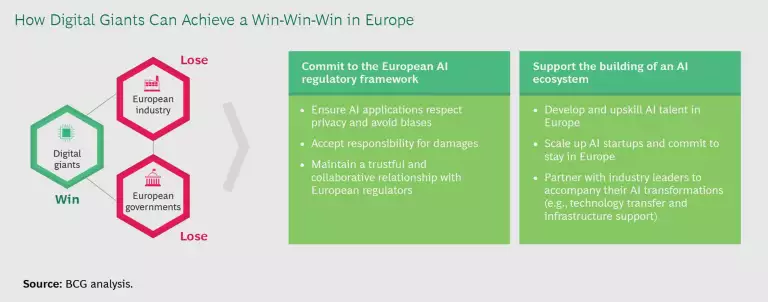This is the third in a series of articles about the future of technology in Europe. Here, we focus on the role digital giants have to play in advancing artificial intelligence on the continent.
It won’t be easy to alter the win-lose relationship in the field of artificial intelligence between the world’s digital giants and the European Union. However, change is needed, and soon, or the digital giants will eventually end up losing, too. They can and must proactively create a win-win dynamic between the EU and themselves. That will not only benefit European consumers, companies, and governments, but also optimize the digital giants’ own strategies.
Read more in the series
Read more in the series
- As the COVID-19 Crisis Reveals, Europe Urgently Needs to Digitize Its Industry
- Europe Can Catch Up in AI, But Must Act—Today
- How Digital Giants and Europe Can Cooperate to Win in AI
Digital Giants Are Winning at Europe’s Expense
At present, the world’s digital giants—such as Amazon, Facebook, Google, Intel, Microsoft, and Alibaba—dominate Europe’s AI landscape without offering much, if any, economic benefit for European countries and companies. In the absence of homegrown competition, they are able to operate without making major investments locally, without creating jobs on the continent, and often without paying much tax. When European countries push back, it leads to cross-border tensions. In July 2019, France’s decision to take on the digital giants by levying a 3% tax almost resulted in a trade war, with the US ordering an investigation that could lead to retaliatory tariffs and other trade restrictions.
The EU’s industry players are losing out because they are unable to capitalize on the digital giants’ presence in Europe.
Meanwhile, the EU’s industry players are losing out because they are unable to capitalize on the digital giants’ presence in Europe. There’s little demand for AI applications, so Europe’s AI readiness remains low. In addition, European digital companies find it difficult to expand geographically because EU regulations restrict the use of key technologies, such as facial recognition, due to privacy concerns. With the scale of AI’s usage crucial for competitiveness, the current situation is clearly unsustainable.
Europe’s Attitude Is Changing
Until now, the EU has demanded little from the digital giants apart from basic compliance with data-protection laws, platform business rules, and other related regulations. But the EU is increasingly waking up to the fact that it is one of the world’s biggest digital markets, enjoys significant negotiating power, and that it should use this power for its long-term benefit.
Although multilateral negotiations will continue, the EU seems likely to take unilateral measures to ensure a level playing field. The EU’s policy environment has changed a great deal in recent years, with the introduction of the General Data Protection Regulation (GDPR) and rulings against digital giants such as Facebook and Google. Several other reforms are in the pipeline, including the recently unveiled data strategy by the European Commission. The EU’s attitude is increasingly insular, with policymakers calling for “EU digital sovereignty” and “respect for EU values for AI.”
Digital Giants Must Make Two Commitments
If the digital companies wish to avoid a scenario in which everyone loses, they must act quickly. Promising to work according to the EU’s regulatory frameworks and helping to build an AI ecosystem in the region will be two steps in the right direction, with long-term benefits that are worth the effort. (See the exhibit.)
First, proactively committing themselves to working within the framework of the EU’s AI-related regulations will require the digital giants to develop AI applications that respect individual privacy and avoid any type of bias. Rather than sticking to the letter of the law, they should accept the spirit of the EU’s regulations, and once they gain credibility in Europe, help refine them. Foreign companies must be willing to accept the responsibility for damages once the regulations are enacted, which will prevent messy rulings, lawsuits, and public disputes with the EU. An environment in which policymakers and digital businesses work together is better than a distrustful regulation-compliance relationship, as EU Commissioner Thierry Breton and Facebook CEO Mark Zuckerberg agreed during a recent debate.
Second, the digital giants should commit to the development of a European AI ecosystem. And this must go beyond simply localizing data centers in order to comply with a given regulation potentially forcing them to do so. This will entail developing and upskilling AI talent, by cultivating partnerships with Europe’s leading universities, for example. These players should also support the scaling of AI startups in Europe, just as venture capital firms would, while committing to retain those operations in the EU even if they acquire them. Furthermore, and crucially, the digital giants should strike strategic partnerships with Europe’s industry leaders, sharing their most advanced technologies to help them with their AI-driven digital transformations. Another way to facilitate the creation of an ecosystem would be to invest in Europe’s AI infrastructure, through the European High-Performance Computing Joint Undertaking, for instance, whose mission is to develop a world-class supercomputing and data infrastructure on the continent.
No digital firm that aspires to be a global leader can afford to walk away from one of the world’s largest economies.
Because of these commitments, the digital giants’ operating costs may rise in Europe in the short run. Greater compliance and collaboration efforts will require resources while supporting talent, and ecosystem development is expensive. However, working with the EU to develop an AI industry in the area is the only viable solution if they are to flourish. Given the size of the European market, no digital firm that aspires to be a global leader can afford to walk away from one of the world’s largest economies, the largest trading block, and the largest investor in terms of attracting and making investments worldwide.
Cooperation Is the Only Path Toward Success
The digital giants need to recognize the strategic opportunity presented by the EU. It’s not just about size or purchasing power; the EU is one of the most sophisticated and differentiated AI markets, especially for industrial applications. The EU provides opportunities to develop and train algorithms for several industries, and it will be impossible for any digital giant to claim it has a global offering if it doesn’t have access to European markets, data, and Europe-trained AI applications. Furthermore, by nurturing the EU’s large talent pools, IT companies can supercharge their AI teams.
The EU also provides learning opportunities because it offers a sophisticated point of view along dimensions that will determine the nature of competition tomorrow. For instance, privacy and ethics are high on the EU’s agenda, so operating within the region ensures that the digital giants are at the cutting edge of those issues. As the chairperson of the EU’s expert group on AI, Pekka Ala-Pietila, recently noted, “Ethics and competitiveness are intertwined.”
Europe is ripe with possibility, but to successfully seize the opportunity and thrive, the digital giants must:
- Build partnerships with Europe’s industry players. Europe is the home of world-leading companies in several industries such as aerospace, automotive, chemicals, consumer goods, energy, food, maritime, and retailing. As the second wave of AI gains ground in B2B markets, European companies offer an opportunity for the digital giants to develop and refine AI applications in these industries. Such partnerships will benefit European companies by allowing them to use new technologies to reinforce their global competitiveness.
- Regard permanent establishment as an opportunity. The digital giants should look beyond regulation and tax optimization and instead treat their EU bases as a strategic decision. Those digital giants that move quickly to seize opportunities to strike partnerships with public and private players will gain an advantage. As a first step, the digital giants should identify, and set up operations in, Europe’s budding AI ecosystems.
- Treat the EU as a future-critical market. As the current COVID-19 pandemic demonstrates, the digital giants, like all transnational companies, must build greater resilience to withstand “black swan” events. One way of achieving this goal is to operate globally while limiting the interdependencies between regions. Companies that treat Europe as central to their operations, and not just as an export market, will be able to boost their resilience. The digital giants would do well to shift from a one-size-fits-all strategy to a multi-local one.
- Use regulation as a cornerstone, and proactively engage with policymakers. Today’s AI regulations will play an important role in shaping the EU’s business environment tomorrow. Merely complying with regulations won’t set up the digital giants for success; gaining competitive advantage requires understanding Europe’s subtleties and helping to shape future regulations. Moreover, many multinational companies have already applied the EU’s GDPR requirements to their worldwide operations, reinforcing the need for the digital giants to earn a seat at the table in Brussels, where future policies will be fashioned.
- Review the AI applications portfolio to ensure it is EU-ready. Privacy issues, ethical concerns, and bias in AI applications anywhere in the world will immediately have a fallout on the digital giants’ operations in Europe. Evaluating the firm’s AI-applications portfolio from a European point of view will be essential to gauge what modifications will be required in the future. For instance, if the EU decides against the use of face-recognition AI applications, the digital giants may have to reconsider their development. Otherwise, they will run the risk of being shut out of the European market altogether.
Eventually, European governments and companies and the world’s digital giants will have to figure out ways of coming together to develop a range of AI solutions that can be used globally. Treating the EU as a mere market, rather than as an equal partner, is unlikely to make that happen. If they think about it, the digital giants will realize that they will, probably, be the biggest losers from persisting with their short-sighted approach to AI in Europe.
The BCG Henderson Institute is the Boston Consulting Group’s strategy think tank, dedicated to exploring and developing valuable new insights from business, technology, and science by embracing the powerful technology of ideas. The Institute engages leaders in provocative discussion and experimentation to expand the boundaries of business theory and practice and to translate innovative ideas from within and beyond business. For more ideas and inspiration follow us on LinkedIn and Twitter: @BCGHenderson.








